2014年6月英语六级真题听力答案
2014年6月英语六级真题及答案(第一套).doc
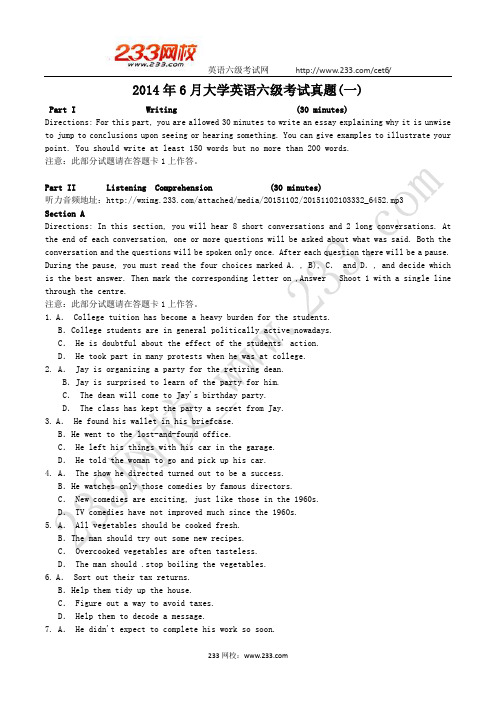
2014年6月大学英语六级考试真题(一)Part I Writing (30 minutes)Directions: For this part, you are allowed 30 minutes to write an essay explaining why it is unwise to jump to conclusions upon seeing or hearing something. You can give examples to illustrate your point. You should write at least 150 words but no more than 200 words.注意:此部分试题请在答题卡1上作答。
Part II Listening Comprehension (30 minutes)听力音频地址:/attached/media/20151102/20151102103332_6452.mp3Section ADirections: In this section, you will hear 8 short conversations and 2 long conversations. At the end of each conversation, one or more questions will be asked about what was said. Both the conversation and the questions will be spoken only once. After each question there will be a pause. During the pause, you must read the four choices marked A., B), C. and D., and decide which is the best answer. Then mark the corresponding letter on ,Answer Shoot 1 with a single line through the centre.注意:此部分试题请在答题卡1上作答。
2014年大学英语CET6真题听力、答案及原文(6月)
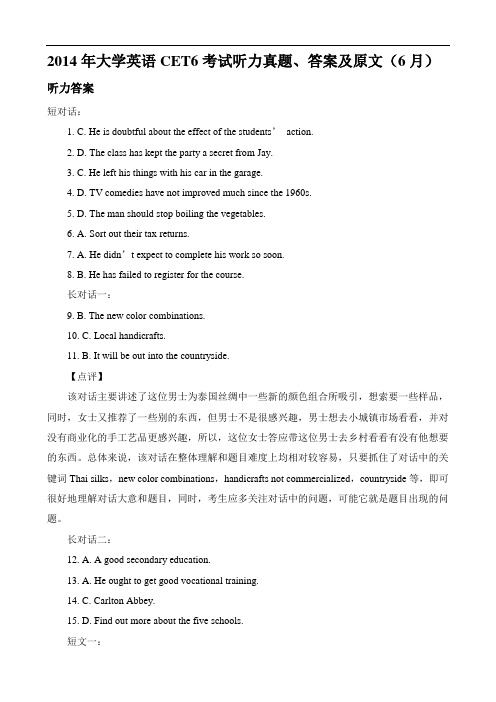
2014年大学英语CET6考试听力真题、答案及原文(6月)听力答案短对话:1. C. He is doubtful about the effect of the students’action.2. D. The class has kept the party a secret from Jay.3. C. He left his things with his car in the garage.4. D. TV comedies have not improved much since the 1960s.5. D. The man should stop boiling the vegetables.6. A. Sort out their tax returns.7. A. He didn’t expect to complete his work so soon.8. B. He has failed to register for the course.长对话一:9. B. The new color combinations.10. C. Local handicrafts.11. B. It will be out into the countryside.【点评】该对话主要讲述了这位男士为泰国丝绸中一些新的颜色组合所吸引,想索要一些样品,同时,女士又推荐了一些别的东西,但男士不是很感兴趣,男士想去小城镇市场看看,并对没有商业化的手工艺品更感兴趣,所以,这位女士答应带这位男士去乡村看看有没有他想要的东西。
总体来说,该对话在整体理解和题目难度上均相对较容易,只要抓住了对话中的关键词Thai silks,new color combinations,handicrafts not commercialized,countryside等,即可很好地理解对话大意和题目,同时,考生应多关注对话中的问题,可能它就是题目出现的问题。
2014年6月英语六级真题及答案解析 第二套

2014年6月大学英语六级考试真题(二)Part I Writing (30 minutes)题目一:Directions: For this part, you are allowed 30 minutes to write an essay explaining why it is unwise to put all eggs in one basket.You can give examples to illustrate your point.You should write at least 150 words and no more than 200words.题目二:Directions: For this part, you are allowed 30 minutes to write an essay explaining why it is unwise to jump to conclusions upon seeing or hearing something.You can give examples to illustrate your point.You should write at least 150 words but no more than 200 words.注意:此部分试题请在答题卡1上作答。
Part ⅡListening Comprehension (30 minutes)Section ADirections: In this section, you will hear 8 short conversations and 2 long conversations.At the end of each conversation, one or more questions will be asked about what was said.Both the conversation and the questions will be spoken only once.After each question there will be a pause.During the pause, you must read the four choices marked A), B), C) and D), and decide which is the best answer .Then mark the corresponding letter on Answer Sheet 1 with a single line through the centre.注意:此部分试题请在答题卡1上作答。
2014年6月大学英语六级真题及答案真题+听力原文+答案详解.docx

2014 年 6 月英语六级真题及答案Part I WritingDirections: For this part, you are allowed 30 minutes to write a short essay on the topic of Due Attention Should Be Given to the Study of Chinese Yo u should write at Chinese. least 120 words following the outline given belo w:1.近年来在学生中出现了忽视中文学习的现象;2.出现这种现象的原因和后果;3我认为,Given Due Attention Should Be Given to the Study of ChinesePart II Reading Comprehension (Skimming and Scanning) (15 minute s)Directions: In this part, you will have 15 minutes to go over the passage qu ickly and answer the questions on Answer sheet 1. For questions 1-7, choo se the best answer from the four choices marked A), B), C) and D). For qu estions 8-10, complete the sen-tences with the information given in the pas sage. Welcome,Freshmen. Have an iPod.Taking a step that many professors may view as a bit counterproductive, so me colleges and universities are doling out Apple iPhones and Internet-cap able iPods to their students.The always-on Internet devices raise some novel possibilities, like tracking where students gather together. With far less controversy, colleges could s end messages about canceled classes, delayed buses, campus crises or just the cafeteria menu.While schools emphasize its usefulness —online research in class and inst ant polling of students, for example — a big part of the attraction is, undou btedly, that the iPhone is cool and a hit with students. Being equipped with one of the most recent cutting-edge IT products could just help a college o r university foster a cutting-edge reputation.Apple stands to win as well, hooking more young consumers with decadesof technology pur- chases ahead of them. The lone losers, some fear, could be professors.Students already have laptops and cell phones, of course, but the newest de vices can take class distractions to a new level. They practically beg a user to ignore the long-suffering professor strug- gling to pass on accumulated wisdom from the front of the room — a prospect that teachers find most irr itating and students view as, well, inevitable.“ When it gets a little boring, I might pull it out,‖acknowledged Naomi P ugh, a first-year student at Freed-Hardeman University in Henderson, Ter m., referring to her new iPod Touch, which can connect to the Internet ove r a campus wireless network. She speculated that professors might try even harder to make classes interesting if they were to compete with the devices. Experts see a movement toward the use of mobile technology in educati on, though they say it is in its infancy as professors try to come up with us eful applications. Providing powerful hand- held devices is sure to fuel deb ates over the role of technology in higher education.“ We think this is the way the future is going to work,‖said Kyle Dickson, co-director of re- search and the mobile learning initiative at Abilene Chris tian University in Texas, which has bought more than 600 iPhones and 300 iPods for students entering this fall.Although plenty of students take their laptops to class, they don’t take the m everywhere and would prefer something lighter. Abilene Christian settle d on the devices after surveying students and finding that they did not like hauling around their laptops, but that most of them always carried a cell ph one, Dr. Dickson said.It is not clear how many colleges and universities plan to give out iPhones and iPods this fall; officials at Apple were unwilling to talk about the subje ct and said that they would not leak any institution plans’s.“ We can’t announce other people’s news,‖saidGreg Joswiak, vice presid ent of iPod and iPhone marketing at Apple. He also said that he could not d iscuss discounts to universities for bulk purchases.At least four institutions — the University of Maryland, Oklahoma Christi an University, Abilene Christian and Freed-Hardeman — have announced t hat they will give the devices to some or all of their students this fall.Other universities are exploring their options. Stanford University has hire d a student-run com-pany to design applications like a campus map and dir ectory for the iPhone. It is considering whether to issue iPhones but not sur e it, snecessary, noting that more than 700 iPhones were registered on the u niversity network’s last year.At the Massachusetts Institute of Technology, iPhones might alreadyhave been everywhere, if AT&T, the wireless carrier offering the iPhone in the United States,had a more reliable network, said Andrew Yu, mobile devices platform pro ject manager at M.I.T.“ We would have probably gone ahead with this, maybe just getting a thou sand iPhones and giving them out, ‖Mr. Yusaid.The University of Maryland at College Park is proceeding cautiously, givi ng the iPhone or iPod Touch to 150 students, said Jeffrey Huskamp, vice p resident and chief information officer at the university. ― Wedon’t think tha t we have all the answers, Mr‖. Huskamp said. By observing how students use the gadgets, he said,― We’ retrying to get answers from the students. ‖ At each college, the students who choose to get an iPhone must pay for mo bile phone service. Those service contracts include unlimited data use. Both the iPhones and the iPod Touch devices can connect to the Internet throu gh campus wireless networks. With the iPhone, those networks may provid e faster connections and longer battery life than A T&T’s data network. Many cell phones allow users to surf the Web, but only some newer ones are c apable of wireless connection to the local area computer network. University officials say that they have no plans to track their students (and Apple said it would not be possible unless students give their permission). They say that they are drawn to the prospect of learning applications outsid e the classroom, though such lesson plans have yet to surface.“ My colleagues and I are studying something called augmented reality (a field of computer research dealing with the combination of real-world and virtual reality), said‖ Christopher Dede, professor in learning technologies at Harvard University. ― AlienContact, for‖ example, is an exer- cise develo ped for middle-school students who use hand-held devices that can determi ne their location. As they walk around a playground or other area, text, vid eo or audio pops up at various points to help them try to figure out why ali ens were in the schoolyard.“ You can imagine similar kinds of interactive activities along historical li nes, ‖like following the Freedom Trail in Boston, Professor Dede said.― It’s important that we do research, so that we know how well something like this works. ‖The rush to distribute the devices worries some professors, who say that st udents are less likely to participate in class if they are multi-tasking. ― I ’m n ot someone who’s anti-technology, but I,m always worried that technology becomes an end in and of itself, and it replaces teaching or it replaces analysis,, said’Ellen Millender, associate professor of classics at Reed College in Portland, Ore. (She added that she hoped to buy an iPhone for herself on ce prices fall.)Robert Summers, who has taught at Cornell Law School for about 40 years,announced this week — in a detailed, footnoted memorandum — that he would ban laptop computers from his class on contract law.“ I would ban that too if I knew the students were using it in class, Profes‖sor Summers said of the iPhone, after the device and its capabilities were e xplained to him. ― Whatwe want to encour- age in these students is an activ e intellectual experience, in which they develop the wide range of complex reasoning abilities required of good lawyers. ‖The experience at Duke University may ease some concerns. A few years a go, Duke began giving iPods to students with the idea that they might use t hem to record lectures (these older models could not access the Internet).“ We had assumed that the biggest focus of these devices would be consu ming the content, said‖ Tracy Futhey, vice president for informationtechn ology and chief information officer at Duke.But that is not all that the students did. They began using the iPods to creat e their own ― content, making‖ audio recordings of themselves and presenti ng them. The students turned what could have been a passive interaction in to an active one, Ms. Futhey said. 注意:此部分试题请在答题卡 1 上作答。
6月英语六级听力真题原文及答案(完整版)

6月英语六级听力真题原文及答案(完整版)2014年6月英语六级听力真题原文及答案(完整版)2014年6月英语六级听力真题原文及答案(完整版)Short Conversation1.W: The students have been protesting against the increased tuition.M: Yeah, I heard about the protest. But I don’t know how much good it will do.Q: What does the man mean?2.W: Jay will turn 21 this week. Does he know the classes are having a surprised party for him?M: No, he thinks we are giving a party for the retiring dean.Q: What do we learn from the conversation?3.M: Hello, this is Carl’s garage. We found Mr. White’s briefcase and wallet after he left his car here this morning.W: He has been wondering where he could have left them. I’ll tell him to pick them up this afternoon. Thank you for calling.Q: What do we learn about Mr. White from the conversation?4.W: You know, some TV channels have been rerunning a lot of comedies from the 1960s’. What do you think of those old shows?M: Not much. But the new ones including those done by famous directors are not so entertaining either.Q: What does the man mean?5.M: How much longer should I boil these vegetables? The recipe says about 10 minutes in total.W: They look pretty done to me. I doubt you should cook them anymore.Q: What does the woman mean?6.W: Tom, are you going to your parents’ house tonight?M: Yes, I promise to help them figure out their tax returns. The tax code is really confusing to them.Q: What is the man going to do for his parents?7.W: I was surprised when I he ard you’d finished your research project a whole month early.M: How I manage to do it’s still a mystery to me.Q: What does the man mean?8.W:I was hoping we could be in the same developmental psychology class.M:Me too, but by the time I went for registration the course was closed.Q: What does the man mean?【点评】本次六级考试的难度与往年持平,继续延续在六级考试中,出现大量推理判断题,即提问方式为:What does the man / woman mean? 这样的题目。
14年6月大学英语六级真题答案
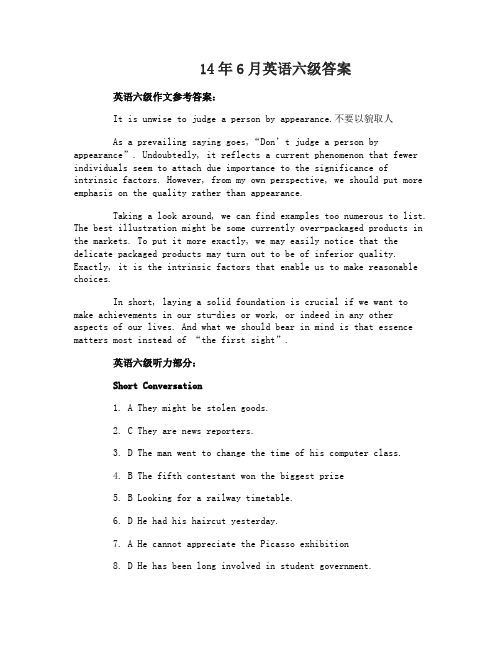
14年6月英语六级答案英语六级作文参考答案:It is unwise to judge a person by appearance.不要以貌取人As a prevailing saying goes,“Don’t judge a person by appearance”. Undoubtedly, it reflects a current phenomenon that fewer individuals seem to attach due importance to the significance ofintrinsic factors. However, from my own perspective, we should put more emphasis on the quality rather than appearance.Taking a look around, we can find examples too numerous to list. The best illustration might be some currently over-packaged products in the markets. To put it more exactly, we may easily notice that the delicate packaged products may turn out to be of inferior quality. Exactly, it is the intrinsic factors that enable us to make reasonable choices.In short, laying a solid foundation is crucial if we want to make achievements in our stu-dies or work, or indeed in any other aspects of our lives. And what we should bear in mind is that essence matters most instead of “the first sight”.英语六级听力部分:Short Conversation1. A They might be stolen goods.2. C They are news reporters.3. D The man went to change the time of his computer class.4. B The fifth contestant won the biggest prize5. B Looking for a railway timetable.6. D He had his haircut yesterday.7. A He cannot appreciate the Picasso exhibition8. D He has been long involved in student government.Long Conversation One9. B Something went wrong with her car.10. D Cost11. A Third-party insurance.Long Conversation Two12. C Where to locate their plant.13. D Their basic facilities are good.14. A Try to avoid making a hasty decision.15. C Road and rail links for small towns.Passage One16. A One fifth of them were on bad terms with their sisters and brothers.17. C Advance in age.18. B They tend to forget past unhappy memories and focus on their present needs.Passage Two19. C They are the only insect that migrates along fixed routes.20. D In a Mexican mountain forest.21. C Each generation in a cycle lays eggs at a different place.22. C Migration patterns of monarch butterflies.Passage Three23. A. Time has becomes more limited.24. B Americans today have more free time than earlier generations.25. D Our behavior is changed.SectionC26. taking into consideration27. literary28. imposed29. anticipate30. violations31. financial32. avenue33. amended34. in the wake of35. interpret英语六级选词填空36.A advantages37.K insured38. C bother39. L major40. H features41. F discount42. I fluctuate43. B assess44. M naturally45. N potential英语六级长篇阅读 Lessons From a Feminist ParadiseJ 46. Sweden has done more than other nations to close the gender gap, but it continues to exist.I 47. Sweden is one of the most competitive economies in the world and its people enjoy the greatest life satis-faction.M 48. More American women hold elite job positions in business than Swedish women.D 49. Swedish family-friendly policies tend to exert a negative influence on women’s career.A 50. The quota system in Sweden ensures women’s better representation in government.H 51. Though the Swedish model appears workable for most American parents, it may not be accepted by them in its entirely.M 52. Swedish women are allowed the freedom and opportunity to choose their own way of life.E 53. Swedish employers are hesitant about hiring women forfull-time positions because of the family-friendly policies.A 54. Gender-awareness education is becoming more and more popular in state-subsidized preschools in Swe-den.C 55. Some lawmakers in Sweden propose the genderless pronouns be used in the Swedish language.英语六级仔细阅读C 56 it will ruin the written languageB 57 it expresses ideas more accuratelyA 58 it brings texters closer to each otherD 59 the gradual change of word meaningB 60 it is a new form of verbal communicationB 61 she worked her way to success in the entertainment industryB 62 she was known as a supporter of fake scienceA 63 he was strongly against itC 64 they attach too much importance to public ralationsD 65 pursuit of knowledge and truth英语六级翻译中文热词通常反映社会变化和文化,有些在外国媒体上愈来愈流行。
6月大学英语六级真题听力答案

6月大学英语六级真题听力答案2014年6月大学英语六级真题听力答案2014年6月大学英语六级真题听力答案Short Conversation1.A They might be stolen goods.2.C They are news reporters.3.D The man went to change the time of his computer class.4.B The fifth contestant won the biggest prize5.B Looking for a railway timetable.6.D He had his haircut yesterday.7.A He cannot appreciate the Picasso exhibition8.D He has been long involved in student government.Long Conversation One9. B Something went wrong with her car.10. D Cost11. A Third-party insurance.Long Conversation Two12. C Where to locate their plant.13. D Their basic facilities are good.14. A Try to avoid making a hasty decision.15. C Road and rail links for small towns.Passage One16. A One fifth of them were on bad terms with their sisters and brothers.17. C Advance in age.18. B They tend to forget past unhappy memories and focus on their present needs.Passage Two19. C They are the only insect that migrates along fixedroutes.20. D In a Mexican mountain forest.21. C Each generation in a cycle lays eggs at a different place.22. C Migration patterns of monarch butterflies.Passage Three23. A. Time has becomes more limited.24. B Americans today have more free time than earlier generations.25. D Our behavior is changed.SectionC26. taking into consideration27. literary28. imposed29. anticipate30. violations31. financial32. avenue33. amended34. in the wake of35. interpret。
2014年6月英语六级真题及答案(第一套)
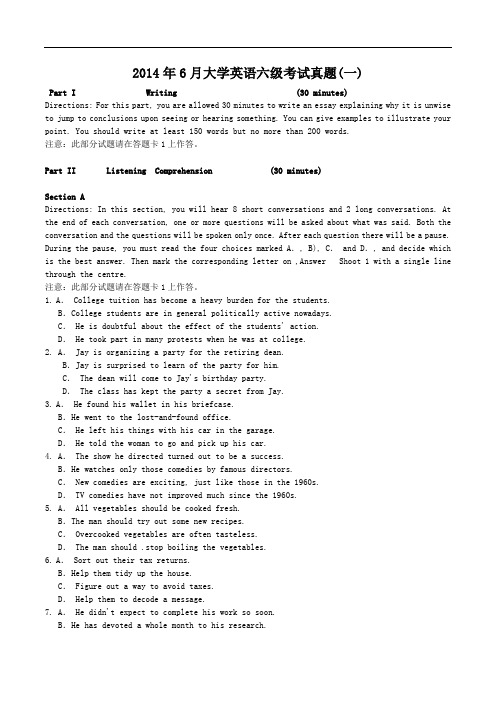
2014年6月大学英语六级考试真题(一)Part I Writing (30 minutes)Directions: For this part, you are allowed 30 minutes to write an essay explaining why it is unwise to jump to conclusions upon seeing or hearing something. You can give examples to illustrate your point. You should write at least 150 words but no more than 200 words.注意:此部分试题请在答题卡1上作答。
Part II Listening Comprehension (30 minutes)Section ADirections: In this section, you will hear 8 short conversations and 2 long conversations. At the end of each conversation, one or more questions will be asked about what was said. Both the conversation and the questions will be spoken only once. After each question there will be a pause. During the pause, you must read the four choices marked A., B), C. and D., and decide which is the best answer. Then mark the corresponding letter on ,Answer Shoot 1 with a single line through the centre.注意:此部分试题请在答题卡1上作答。
2014年6月大学英语六级考试真题(三)及答案

2014年6月大学英语六级考试真题(三)及答案2014年6月大学英语六级考试真题(三)Part I Writing (30 minutes)Directions: For this part, you are allowed 30 minutes to write an essay explaining why it is unwise to judge a person by their appearance. You can give examples to illustrate your point. You should write at least 150 words but no more than 200 words.注意:此部分试題请在答题1上作答。
PartⅡListening Comprehension (30 minutes)Section ADirections: In this section, you will hear 8 short conversations and 2 long conversations. At the end of each conversation, one or more questions will be asked about what was said. Both the conversation and the questions will be spoken only once. After each question there will be a pause. During the pause, you must read the four choices marked A), B), C) and D), and decide which is the best answer. Then mark the corresponding letter on Answer Sheet 1 with a single line through the centre.注意:此部分试题请在答题卡1上作答.1. A) Surfing the net. C) Packing a birthday gift.B) Watching a talk show. D) Shopping at a jewelry store.2. A) He enjoys finding fault with exams.B) He is sure of his success in the exam.C) He doesn't know if he can do well in the exam.D) He used to get straight A’s in the exams he took.3. A) The man is generous with his good comments on people.B) The woman is unsure if there will be peace in the world.C) The woman is doubtful about newspaper stories.D) The man is quite optimistic about human nature.4. A) Study for some profession. C) Stay in business.B) Attend a medical school. D) Sell his shop.5. A) More money. C) A college education.B) Fair treatment. D) Shorter work hours.6. A) She was exhausted from her trip. C) She was impressed by Mexican food.B) She missed the comforts of home. D) She will not go to Mexico again.7. A) Cheer herself up a bit. C) Seek professional advice.B) Find a more suitable job. D) Take a psychology course.8. A) He dresses more formally now. C) He has ignored his friends since graduation.B) What he wears does not match his position. D) He failed to do well at college.Questions 9 to 12 are based on the conversation you have just heard.9. A) To go sightseeing. C) To promote a new champagne.B) To have meetings. D) To join in a training program.10. A) It can reduce the number of passenger complaints.B) It can make air travel more entertaining.C) It can cut down the expenses for air travel.D) It can lessen the discomfort caused by air travel.,11. A) Took balanced meals with champagne. C) Refrained from fish or meat.B) Ate vegetables and fruit only. D) Avoided eating rich food.12. A) Many of them found it difficult to exercise on a plane.B) Many of them were concerned with their well-being.C) Not many of them chose to do what she did.D) Not many of them understood the program.Questions 13 to 15 are based on the conversation you have just heard.13. A) At a fair. C) In a computer lab.B) At a cafeteria. D) In a shopping mall.14. A) The latest computer technology. C) The purchasing of some equipment.B) The organizing of an exhibition. D) The dramatic changes in the job market15. A) Data collection. C) Corporate management.B) Training consultancy. D) Information processing.Section BDirections: In this section, you will hear 3 short passages. At the end of each passage, you will hear some questions. Both the passage and the questions will be spoken only once. After you hear a question, you must choose the best answer from the four choices marked A), B), C) and D). Then mark the corresponding letter on Answer Sheet 1 with a single line through the centre.注意:此部分试题请在答题卡1上作答。
2014年6月大学英语六级真题试卷(三)(题后含答案及解析)
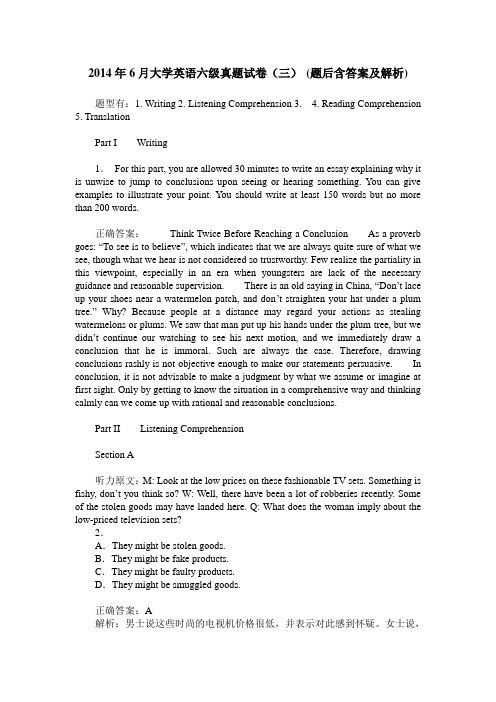
2014年6月大学英语六级真题试卷(三)(题后含答案及解析)题型有:1. Writing 2. Listening Comprehension 3. 4. Reading Comprehension 5. TranslationPart I Writing1.For this part, you are allowed 30 minutes to write an essay explaining why it is unwise to jump to conclusions upon seeing or hearing something. You can give examples to illustrate your point. You should write at least 150 words but no more than 200 words.正确答案:Think Twice Before Reaching a Conclusion As a proverb goes: “To see is to believe”, which indicates that we are always quite sure of what we see, though what we hear is not considered so trustworthy. Few realize the partiality in this viewpoint, especially in an era when youngsters are lack of the necessary guidance and reasonable supervision. There is an old saying in China, “Don’t lace up your shoes near a watermelon patch, and don’t straighten your hat under a plum tree.”Why? Because people at a distance may regard your actions as stealing watermelons or plums. We saw that man put up his hands under the plum tree, but we didn’t continue our watching to see his next motion, and we immediately draw a conclusion that he is immoral. Such are always the case. Therefore, drawing conclusions rashly is not objective enough to make our statements persuasive. In conclusion, it is not advisable to make a judgment by what we assume or imagine at first sight. Only by getting to know the situation in a comprehensive way and thinking calmly can we come up with rational and reasonable conclusions.Part II Listening ComprehensionSection A听力原文:M: Look at the low prices on these fashionable TV sets. Something is fishy, don’t you think so? W: Well, there have been a lot of robberies recently. Some of the stolen goods may have landed here. Q: What does the woman imply about the low-priced television sets?2.A.They might be stolen goods.B.They might be fake products.C.They might be faulty products.D.They might be smuggled goods.正确答案:A解析:男士说这些时尚的电视机价格很低,并表示对此感到怀疑。
2014年6月英语六级真题及答案解析+第二套
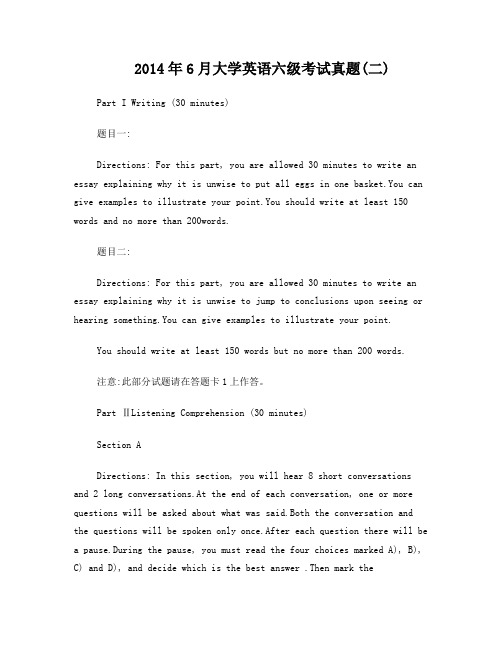
2014年6月大学英语六级考试真题(二)Part I Writing (30 minutes)题目一:Directions: For this part, you are allowed 30 minutes to write an essay explaining why it is unwise to put all eggs in one basket.You can give examples to illustrate your point.You should write at least 150 words and no more than 200words.题目二:Directions: For this part, you are allowed 30 minutes to write an essay explaining why it is unwise to jump to conclusions upon seeing or hearing something.You can give examples to illustrate your point.You should write at least 150 words but no more than 200 words.注意:此部分试题请在答题卡1上作答。
Part ⅡListening Comprehension (30 minutes)Section ADirections: In this section, you will hear 8 short conversations and 2 long conversations.At the end of each conversation, one or more questions will be asked about what was said.Both the conversation and the questions will be spoken only once.After each question there will be a pause.During the pause, you must read the four choices marked A), B), C) and D), and decide which is the best answer .Then mark thecorresponding letter on Answer Sheet 1 with a single line through the centre.注意:此部分试题请在答题卡1上作答。
2014年6月英语六级真题及答案(第一套).doc

2014年6月大学英语六级考试真题(一)Part I Writing (30 minutes)Directions: For this part, you are allowed 30 minutes to write an essay explaining why it is unwise to jump to conclusions upon seeing or hearing something. You can give examples to illustrate your point. You should write at least 150 words but no more than 200 words.注意:此部分试题请在答题卡1上作答。
Part II Listening Comprehension (30 minutes)听力音频地址:/attached/media/20151102/20151102103332_6452.mp3Section ADirections: In this section, you will hear 8 short conversations and 2 long conversations. At the end of each conversation, one or more questions will be asked about what was said. Both the conversation and the questions will be spoken only once. After each question there will be a pause. During the pause, you must read the four choices marked A., B), C. and D., and decide which is the best answer. Then mark the corresponding letter on ,Answer Shoot 1 with a single line through the centre.注意:此部分试题请在答题卡1上作答。
2014年6月大学英语六级考试真题(三)及答案
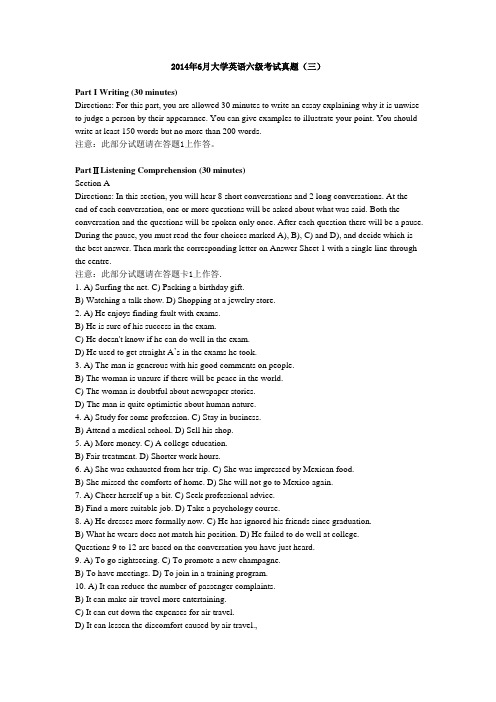
2014年6月大学英语六级考试真题(三)Part I Writing (30 minutes)Directions: For this part, you are allowed 30 minutes to write an essay explaining why it is unwise to judge a person by their appearance. You can give examples to illustrate your point. You should write at least 150 words but no more than 200 words.注意:此部分试題请在答题1上作答。
PartⅡListening Comprehension (30 minutes)Section ADirections: In this section, you will hear 8 short conversations and 2 long conversations. At the end of each conversation, one or more questions will be asked about what was said. Both the conversation and the questions will be spoken only once. After each question there will be a pause. During the pause, you must read the four choices marked A), B), C) and D), and decide which is the best answer. Then mark the corresponding letter on Answer Sheet 1 with a single line through the centre.注意:此部分试题请在答题卡1上作答.1. A) Surfing the net. C) Packing a birthday gift.B) Watching a talk show. D) Shopping at a jewelry store.2. A) He enjoys finding fault with exams.B) He is sure of his success in the exam.C) He doesn't know if he can do well in the exam.D) He used to get straight A’s in the exams he took.3. A) The man is generous with his good comments on people.B) The woman is unsure if there will be peace in the world.C) The woman is doubtful about newspaper stories.D) The man is quite optimistic about human nature.4. A) Study for some profession. C) Stay in business.B) Attend a medical school. D) Sell his shop.5. A) More money. C) A college education.B) Fair treatment. D) Shorter work hours.6. A) She was exhausted from her trip. C) She was impressed by Mexican food.B) She missed the comforts of home. D) She will not go to Mexico again.7. A) Cheer herself up a bit. C) Seek professional advice.B) Find a more suitable job. D) Take a psychology course.8. A) He dresses more formally now. C) He has ignored his friends since graduation.B) What he wears does not match his position. D) He failed to do well at college.Questions 9 to 12 are based on the conversation you have just heard.9. A) To go sightseeing. C) To promote a new champagne.B) To have meetings. D) To join in a training program.10. A) It can reduce the number of passenger complaints.B) It can make air travel more entertaining.C) It can cut down the expenses for air travel.D) It can lessen the discomfort caused by air travel.,11. A) Took balanced meals with champagne. C) Refrained from fish or meat.B) Ate vegetables and fruit only. D) Avoided eating rich food.12. A) Many of them found it difficult to exercise on a plane.B) Many of them were concerned with their well-being.C) Not many of them chose to do what she did.D) Not many of them understood the program.Questions 13 to 15 are based on the conversation you have just heard.13. A) At a fair. C) In a computer lab.B) At a cafeteria. D) In a shopping mall.14. A) The latest computer technology. C) The purchasing of some equipment.B) The organizing of an exhibition. D) The dramatic changes in the job market15. A) Data collection. C) Corporate management.B) Training consultancy. D) Information processing.Section BDirections: In this section, you will hear 3 short passages. At the end of each passage, you will hear some questions. Both the passage and the questions will be spoken only once. After you hear a question, you must choose the best answer from the four choices marked A), B), C) and D). Then mark the corresponding letter on Answer Sheet 1 with a single line through the centre.注意:此部分试题请在答题卡1上作答。
英语六级真题听力试题及答案2014年6月

2014061.A)They might be stolen goodsB)They might be fake productsC)They might be faulty productsD)They might be smuggled good2.A)They are civil servantsB)They are job applicantsC)They are news reportersD)They are public speakers3.A)The man has decided to quit his computer classB)The woman wants to get a degree in administrationC)A computer degree is a must for administrative workD)The man went to change the time of his computer class4.A)A lot of contestants participated in the showB)The fifth contestant won the biggest prizeC)It was not as exciting as he had expectedD)It was sponsored by a car manufacturer5.A)Reading a newspaper columnB)Looking at a railway timetableC)Driving form New York to BostonD)Waiting for someone at the airport6.A)He wears a coat bought in the mallB)He got a new job at the barbershopC)He had a finger hurt last nightD)He had his hair cut yesterday7.A)He cannot appreciate the Picasso exhibitionB)Even his nephew can draw as well as PicassoC)He is not quite impressed with modern paintingsD)Some drawings by kindergarten kids are excellent8.A)He should not put the cart before the horseB)His conduct does not square with his wordsC)His attitude to student government has changedD)He has long been involved in student governmentQuestions 9 to 11 are based on the conversation you have just heard9.A)She left her own car in ManchesterB)Something went wrong with her carC)She wants to go traveling on the weekendD)Her car won,t be back in a week,s time10.A)SafetyB)SizeC)ComfortD)Cost11.A)Third-party insuranceB)V a lu e-a dd e d t axC)PetrolD)CD W12.A)How to update the basic facilitiesB)What to do to enhance their positionC)Where to locate their plantD)How to attract investments13.A)Their road link to other European countries is fastB)They are all located in the south of FranceC)They are very close to each otherD)Their basic facilities are good14.A)Try to avoid making a hasty decisionB)Take advantage of the train linksC)Talk with the local authoritiesD)Conduct field surveys first15.A)Future product distributionB)Local employment policiesC)Road and rail links for small townsD)Skilled workforce in the hilly region16.A)One fifth of them were on bad terms with their sisters and broithers.B)About one eighth of them admitted to lingering bitter feelings.C)More than half of them were involved in inheritance disputes.D)Most of them had broken with their sisters and brothers.17.A)Less concern with money matters.B)More experience in worldly affairs.C)Advance in age.D)Freedom from work.18.A)They have little time left to renew contact with their brothers and sisters.B)They tend to forget past unhappy memories and focus on their present needs .C)They are more tolerant of one another.D)They find close relatives more reliable.19.A)They have bright colors and intricate patterns.B)They can only survive in parts of the Americas.C) Train clients to use financial software.D)They have strong wings capable of flying long distances.20.A)In a Michigan mountain forest.B)In a Louisiana mountain forest.C)In a Kentucky mountain forest.D)In aMexican mountain forest.21.A)Each flock of butterflies lays eggs in the same states.B)They start to lay eggs when they are nine months old.C)Each generation in a cycle lays eggs at a different place.D)Only the strongest can reach their destination to lay eggs.22.A)Evolution of monarch butterflies.B)Living habits of monarch butterflies.C)Migration patterns of monarch butterflies.D)Environmental impacts on monarch butterfly life.23.A)Time has become more limitedB)Time has become more preciousC)Time is moneyD)Time is relative24.A)Americams now attach more importance to the effective use of time.B)Americans today have more free time than earlier generationsC)The number of hours Americans work has increased steadilyD)More and more Americans feel pressed for time nowadays25.A)Our interpersonal relationships improveB)Our work efficiency increases greatly.C)Our living habits are alteredD)Our behavior is changedThe first copyright law in the United States was passed by Congress in1790. .In1976 Congress enacted the latest copyright law, __(26) __ the technological developmen ts that had occurred since the passage of the Copyright Act of 1909.For example,in 1909,anyone who wanted to make a single copy of a __(27)__ work for personal use had to do so by hand.The very proces s__(28) __ a limitation on the quantity of materials copied. Today, a photocopier can do the work i n seconds; the limitation has diasppeared. The 1909 law did not provide full protection for filmsand suond recording,nor did it__(29) __ the need to protect radio and television. As a result,__(30) __ of the law and abuese of the intent of the law have lessened the__(31) __ rewards of authors,artises,and producers.The 1976 Copyright Act has not prevented these abuses f u l l y,b u t i t h a s c l a r i f i e d t h e l e g a l r i g h t s o f t h e i n j u r e d p a r t i e s a n d g i v e n t h e m a n__(32)__ for remedy. since 1976 the Act has be en__(33) __ to inclued computer sofrware,and g u i e d l i n e s h a v e b e e n a d p o t e d f o r f a i r u s e o f t e l e v i s i o n b r o a d c a s e s.T h e s e c h a n g e s h a v e cleared up much of the confusion and conflict that followed__(34) __ the 1976 legislation. The fine points of the law are decided by the c ourts and by acceptable common practice over time.As these decisions and agreements are made,we modify our behavior accordingly.For n o w,w e n eed to__(35) __ the law andits guidelines as accurat ely as we can and to act in a fair manner.答案200606CDBCD ACBBA BCBDA DACBA200612DCBCD ABABD ACBAA B C C D A D ACDBAddition psychologist recognic challenges wisdom identify secret specific demonstraction acquisitiontaught infants200706ABDCA BCABD DCACB ADDBB ABDAClicensedobligationassess coordinatecircumstanceinappropriateresponsibilityprimeCBACB DBCAB ABDBC DCDAC DBADB squarelyfloatingOccasionallydutifullywittyhumorousguiltmaterial200806ADCAB ADCBA DBCAB DABDD BCDBC SurvivecomplicatedoffendersWherebyincurrunginfluenceservingrestore200812ACDCD DACBA CACAD BCBDB AABDC appearancesymbolexportedapparentpercentagecombinationconvenient200906DBCDC BAABD DACDC BACBB ACDAD tongueofficialadministrationcommercespreaddisadvantagedconfidenceinvestigate200912ACABD ADCDA CDBDC AABDD BCBACderivedimmenseconvenientaccuracylargely instinct recalls texture 201006A C DB A ADADC BCABB CAABC BCDDDintelligentfoundationsromanticreflectsprofound dramatically deprived hindered201012A B C B A DDCDD CBDBD CBAAB BCABCdiverse tragic commit outcome scale colleagues accurate averages201106CBCAA DAACC ACDDB B D B B A CBDAAflavors confused particulary behavior variety overwhelmedsenior strategies201112ACAAC DAABD DCCDD DCCAD ABDCBDetect delicate identifying apartment revolutiondramatically primitive vessels201206ACACD BCADA CBDDC C D C C A DDAABslight official shrinking Plunge Decline Primaryheads Poverty201212BBDCC BAADC CBADA CADAD BACBDpotentially experienced gasp dizzy fatigue contantadverse precautions201306B C D A A B D C B A CDDBC ABABD BCDABIncluded categories similar acquaintancerecently volunteer citizen indicative201312D B B C A CADBA CCBDD ACBAC BDDABLegislation instruction efficient dropout discipline contend in favor of at the disposal inferior t o201406CDCDD AABBC BAACD CABCA DDCBBanxiety identifies compares to a body of motivate define fundamental ruined In short imperfect。
2014年6月英语六级真题及答案解析 第二套

2014年6月大学英语六级考试真题(二)Part I Writing (30 minutes)题目一:Directions: For this part, you are allowed 30 minutes to write an essay explaining why it is unwise to put all eggs in one basket.You can give examples to illustrate your point.You should write at least 150 words and no more than 200words.题目二:Directions: For this part, you are allowed 30 minutes to write an essay explaining why it is unwise to jump to conclusions upon seeing or hearing something.You can give examples to illustrate your point.You should write at least 150 words but no more than 200 words.注意:此部分试题请在答题卡1上作答。
Part ⅡListening Comprehension (30 minutes)Section ADirections: In this section, you will hear 8 short conversations and 2 long conversations.At the end of each conversation, one or more questions will be asked about what was said.Both the conversation and the questions will be spoken only once.After each question there will be a pause.During the pause, you must read the four choices marked A), B), C) and D), and decide which is the best answer .Then mark the corresponding letter on Answer Sheet 1 with a single line through the centre.注意:此部分试题请在答题卡1上作答。
2014年六月英语六级真题及听力解析

2014年英语六级真题PartI Writing ( 30minutes)1.Directions: For this part, you are allowed 30 minutes to write an essay explaining why it is unwise to put all your eggs in one basket. You can give examples to illustrate your point .You should write at least 150 words but no more than 200 words.Or 2.Directions: For this part, you are allowed 30 minutes to write an essay explaining why it is unwise a person by their appearance. You can give examples to illustrate your point .You should write at least 150 words but no more than 200 words.Or3.Directions: For this part, you are allowed 30 minutes to write an essay explaining why it is unwise to jump to conclusions upon seeing or hearing something. You can give examples to illustrate your point .You should write at least 150 words but no more than 200 words. Part ⅡListening Comprehension (30 minutes)Section ADirections:In this section,you will hear 8 short conversations and 2 long conversations.At the end of each conversation, one or more questions will be asked about what was said.Both the conversation and the questions will be spoken only once.After each question there will be a pause.During the pause,you must read the four choices marked A),B),C)and D),and decide which is the best answer.Then mark the corresponding letter on Answer Sheet1 with a single line through the centre.注意:此部分试题请在答题卡1上作答。
- 1、下载文档前请自行甄别文档内容的完整性,平台不提供额外的编辑、内容补充、找答案等附加服务。
- 2、"仅部分预览"的文档,不可在线预览部分如存在完整性等问题,可反馈申请退款(可完整预览的文档不适用该条件!)。
- 3、如文档侵犯您的权益,请联系客服反馈,我们会尽快为您处理(人工客服工作时间:9:00-18:30)。
1. C. He is doubtful about the effect of the students’ action.
2. D. The class has kept the party a secret from Jay.
3. C. He left his things with his car in the garage.
4. D. TV comedies have not improved much since the 1960s.
5. D. The man should stop boiling the vegetables.
6. A. Sort out their tax returns.
7. A. He didn’t expect to complete his work so soon.
8. B. He has failed to register for the course.
9. B. The new color combinations.
10. B. Traditional Thai silks.
12. A. A good secondary education.
13. A. He ought to get good vocational training.
14. C. Carlton Abbey.
15. D. Find out more about the five schools.
11. B. It will be out into the countryside.
16. C) It will have a large space for storage.
17. A) On the first floor.
18. B) To match the style of construction on the site.
19. C) Train clients to use financial software.
20. A) Unsuccessful.
21. D) He provided individual support.
22. D) The fault might lie in his style of presenting the information.
23. C) They have little close contact with adults.
24. B) Writers and lawyers are brought in to talk to students.
25. B) Children are often the best teachers of other children.
Tests may be the most unpopular part of academic life. Students hate them because they produce fear and anxiety about being evaluated, and focus on grades instead of learning for learning's sake. But tests are also valuable. A well-constructed test identifies what you know and what you still need to learn. Tests help you see how your performance compares to that of others. And knowing that you'll be tested on a body of material is certainly likely to motivate you to learn the material more thoroughly. However, there's another reason you might dislike tests. You may assume that tests have the power to define your worth as a person. If you do badly on a test, you may be tempted to believe that you received some fundamental information about yourself from the professor --- information that says you are a failure in some significant way. This is a dangerous and wrong-headed assumption. If you do badly on a test, it doesn't mean you are a bad person or stupid or that you'll never do better again and that your life is ruined. If you don't do well on a test, you're the same person you were before you took the test. No better, no worse. You just did badly on a test. That's it! In short, tests are not a measure of your value as an individual. They're a measure only of how well and how much you studied. Tests are tools. They're indirect and imperfect measures of what we know.。
